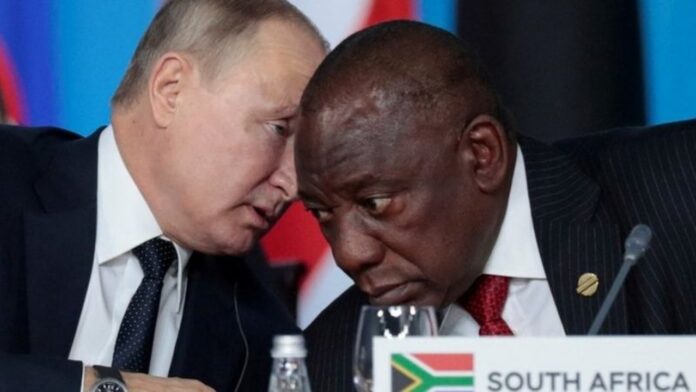In a significant development, South Africa is planning to revise its legislation to grant itself the authority to determine whether to apprehend a leader wanted by the International Criminal Court (ICC), according to Deputy Minister Obed Bapela. This announcement comes amid growing speculation regarding South Africa’s invitation to Russian President Vladimir Putin to visit in August, despite an outstanding ICC arrest warrant against him related to the Ukraine conflict. Earlier, South Africa had extended an invitation to President Putin to attend a summit of the Brics nations, comprised of Brazil, Russia, India, China, and South Africa. However, Russia has not confirmed whether President Putin intends to attend the summit. Additionally, South Africa has granted diplomatic immunity to Russian officials attending the summit, which the country’s foreign affairs department deemed as a standard procedure. The proposed amendment to South Africa’s law would grant the nation exemptions regarding whom to arrest and whom to spare. Currently, under its existing laws, South Africa is obligated to apprehend President Putin if he sets foot on its soil due to its membership in the ICC. However, South Africa has chosen not to denounce Russia’s invasion of Ukraine and instead expressed a desire to maintain a neutral stance. The ICC issued the arrest warrant for President Putin in March, accusing him of war crimes. However, Moscow has vehemently denied these allegations.
In response, South Africa’s main opposition party, the Democratic Alliance (DA), has filed a court application to compel the authorities to arrest President Putin should he visit in August. Deputy Minister Bapela also criticized the ICC for what he perceived as double standards and highlighted the court’s failure to indict former leaders like Tony Blair and George W. Bush for their actions in Iraq. He argued that the late Nelson Mandela, South Africa’s first democratically elected president, would have been disappointed with the ICC’s inequality and inconsistency. Mr. Bapela cited previous instances, such as the UK’s decision not to extradite General Augusto Pinochet in 1998, as examples of international justice exemptions.
South Africa intends to communicate with the ICC regarding a waiver under Article 98 of the Rome Statute, which establishes the court. While Article 27 stipulates that no one is immune from prosecution by the ICC, Article 98 suggests that the court cannot demand South Africa to arrest President Putin unless Russia agrees to waive his immunity from prosecution. The proposed law amendment, which is scheduled to be submitted to parliament in June, will enable South Africa to assert its discretion in arresting ICC-wanted leaders, including President Putin.


